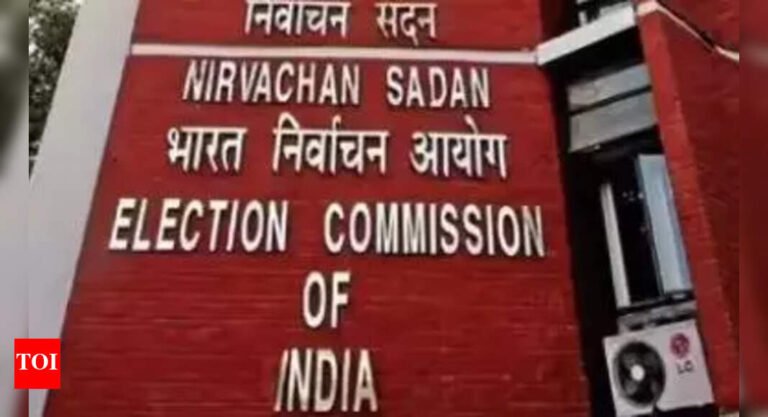
Pan-India Special Intensive Revision of Electoral Rolls: ECI to Announce First Phase Dates on Monday
The Election Commission of India (ECI) is set to announce the first phase of the pan-India special intensive revision (SIR) of electoral rolls on Monday, covering 10-15 states and union territories, including poll-bound West Bengal, Tamil Nadu, Kerala, Assam, and Puducherry. The move aims to create a cleaner and error-free electoral roll by removing duplicate entries, illegal immigrants, and dead or shifted voters. The ECI has been preparing for the SIR for the past two months, with two separate conferences of chief electoral officers held in September and October.
The Election Commission of India (ECI) is all set to announce the first phase of the pan-India special intensive revision (SIR) of electoral rolls on Monday, a move that is expected to cover 10-15 states and union territories, including poll-bound West Bengal, Tamil Nadu, Kerala, Assam, and Puducherry. The announcement comes after the ECI had undertaken a similar exercise in Bihar, which resulted in the removal of nearly 65 lakh voters from the electoral roll. The ECI has been preparing for the SIR for the past two months, with two separate conferences of chief electoral officers held in September and October. The commission has also trained booth level officers and urged parties to appoint enough booth level agents to ensure a smooth and transparent process.
Objective of the Pan-India SIR
The objective of the pan-India SIR is to create a cleaner and error-free electoral roll by removing duplicate entries, illegal immigrants, and dead or shifted voters. The exercise aims to ensure that the electoral roll is accurate and up-to-date, which is essential for the conduct of free and fair elections. The ECI has been working towards this goal for several months, and the announcement of the first phase of the SIR is a significant step in this direction.
States and Union Territories to be Covered
The first phase of the SIR is expected to cover 10-15 states and union territories, including:
* West Bengal
* Tamil Nadu
* Kerala
* Assam
* Puducherry
* Other states and union territories that are not scheduled to hold local body elections in the near future
The ECI has excluded states like Maharashtra, where local body elections are scheduled to be held by January 31, 2026, as per Supreme Court directives. The snow-bound states and union territories of Jammu and Kashmir, Himachal Pradesh, Uttarakhand, Sikkim, and Ladakh will also be excluded from the first phase of the SIR.
Process of the SIR
The process of the SIR will involve several stages, including:
* Mapping of current electors with the roll from the last intensive revision
* Verification of electoral rolls by booth level officers
* Enrolment of new voters and removal of duplicate entries, illegal immigrants, and dead or shifted voters
* Publication of the draft electoral roll
* Invitation of claims and objections
* Finalization of the electoral roll
The ECI has indicated that the list of documents to be accepted as proof of eligibility will be more or less the same as in Bihar and will only be indicative and not exhaustive. Aadhaar will only be accepted as proof of identity.
Key Highlights of the SIR
Some of the key highlights of the SIR include:
* The exercise will be conducted in stages, with three broad categories of states and union territories
* The ECI will announce the SIR at a press conference, allowing any queries and doubts to be addressed on the spot
* The enrolment stage for the first phase of the SIR may start on November 1, and the final roll may be published by January end or the beginning of February
* The ECI has trained booth level officers and urged parties to appoint enough booth level agents to ensure a smooth and transparent process
Reaction of Political Parties
The announcement of the SIR has evoked a mixed reaction from political parties. While the ruling Bharatiya Janata Party (BJP) has welcomed the move, the opposition parties have expressed concerns about the potential impact on the electoral process. Tamil Nadu Chief Minister and DMK chief M K Stalin has accused the BJP of “plotting to remove names from the voter list” ahead of the state polls, as in Bihar. “It (SIR) deprived nearly 65 lakh voters in poll-bound Bihar of their voting rights,” he alleged.
Quotes from Political Leaders
Some of the quotes from political leaders on the SIR include:
* “The SIR is a welcome move, and we hope it will help to create a cleaner and error-free electoral roll.” – BJP leader
* “The SIR is a ploy by the BJP to remove names from the voter list and influence the outcome of the elections.” – M K Stalin, Tamil Nadu Chief Minister and DMK chief
Conclusion
The announcement of the pan-India SIR is a significant step towards creating a cleaner and error-free electoral roll. The exercise aims to ensure that the electoral roll is accurate and up-to-date, which is essential for the conduct of free and fair elections. While the move has evoked a mixed reaction from political parties, it is hoped that the SIR will help to strengthen the electoral process and promote democracy in the country.
Keywords: Pan-India Special Intensive Revision, Electoral Rolls, Election Commission of India, West Bengal, Tamil Nadu, Kerala, Assam, Puducherry, Bharatiya Janata Party, DMK, M K Stalin
Hashtags: #PanIndiaSIR #ElectoralRolls #ECI #WestBengal #TamilNadu #Kerala #Assam #Puducherry #BJP #DMK #MKStalin #IndianElections #Democracy #VotingRights
Source link